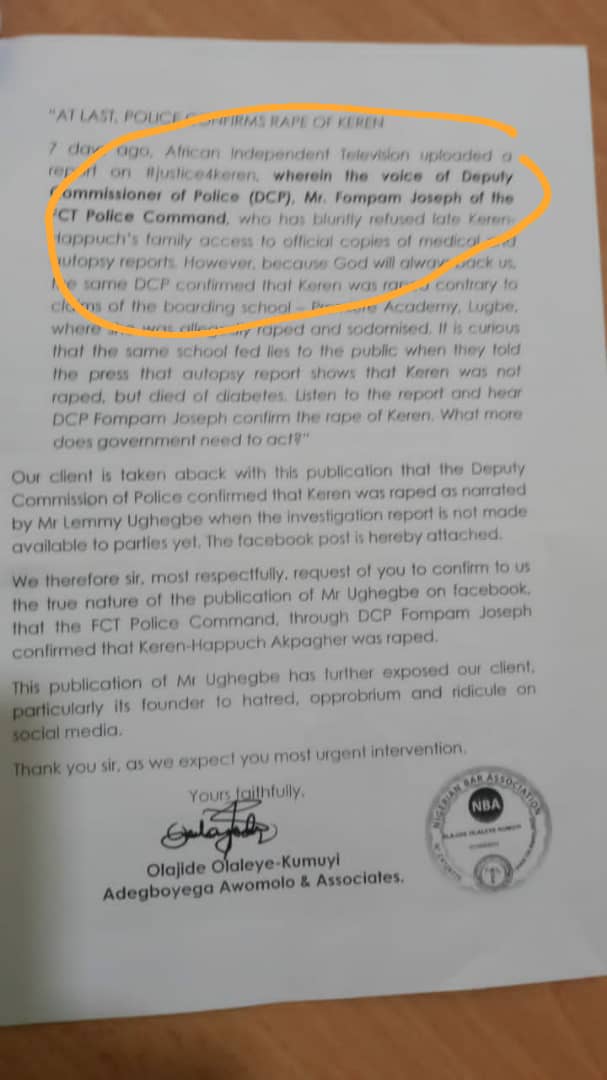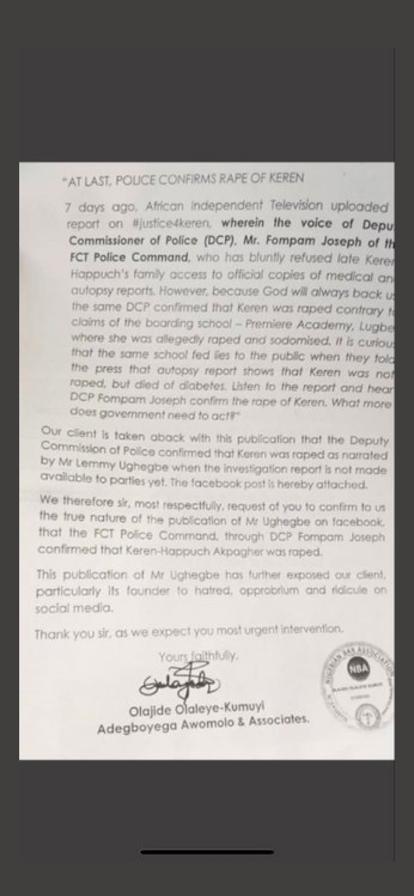Feature/OPED
Karen Akpagher and Premiere Academy: The “Truth” They Are Trying to Bury

By Noah Christopher
Nearly six months ago, Premiere Academy entered the media spotlight when news broke that one of its students, Karen Happuch Akpagher, had died in a hospital in Abuja.
The news of the death of the 14-year old diabetics’ patient which occurred on 22nd June 2021 soon became a hot issue as several media stories authoritatively claimed she was raped to death, sodomized and forced into an oath of secrecy to booth.
Expectedly, the Nigeria Police Force, first through the FCT Police Command and, later, the Office of the Inspector General of Police, promptly commenced investigations into the matter same June, leading to an autopsy conducted in July.
Several other government agencies such as the Ministry of Education, the Directorate of Quality Assurance, the National Human Rights Commission and a few other external bodies also waded into the case by conducting probes and investigations on diverse scales and to cover different angles.
The Premiere Academy PTA and Board also conducted internal investigations. However, despite all the probes, the answer to the key question of Who/What killed Karen has not been found. Interestingly, none of these probes has indicted the school or led to halting its operation.
Perhaps, tired of waiting for official police reports on the autopsy and investigation and seeking to prevent the issue from being swept into silence, Lemmy Ughegbe, an Abuja based journalist, human rights activist and school proprietor instantly activated his NGO, Coalition of Gender-Based Violence Responders, to promote the cause of championing justice for Karen Akpagher.
With Karen’s mother by his side, Lemmy Ughegbe and GBV Responders have launched coordinated multi-pronged advocacy spanning media and political institutions, with the aim of getting the death of Karen hanged on Premiere Academy.
The evidence, according to the media interventions by the group, is a report allegedly issued to the Akpagher family by Queen’s Hospital, Abuja that said decomposed condom particles were found in the late teenager’s genital, in addition to dead spermatozoa.
No audio or video recording of the victim accusing the school or any staff of raping or sexually molesting her; no notation on rape or sexual molestation in the victim’s diary (from which a few media stories have lifted entries); no conclusive report from the autopsy witnessed by all parties and supervised by the police; no report from the police or any private investigator has surfaced to back the claim of rape to date.
Perverting Cause of Justice…
In what appears like frustration by a failure of the coordinated campaign to nudge the relevant state and non-state institutions into a mob-styled condemnation of the school, the GBV Responders has further accused the school of blocking the Akpagher family from getting justice.
The coordinated social media campaign to push this viewpoint claimed because the owner of the school is a highly connected Nigerian, he was using his connection to obstruct justice for Karen.
However, to accuse a school that has opened its doors to and provided its officials for not less than 16 investigations, invitations, probes and interviews on this Karen matter by several interested bodies from June 25th to December 9th of persecuting the cause of justice seems unfair.
Curiously, a check at the school revealed that the GBV Responders that has been championing this claim was one of the NGOs that visited the school on July 3rd to conduct an investigation.
Others that have also visited the school, apart from the Police, include the Federal Competition & Consumer Protection Council (2nd July), Directorate of Quality Assurance, FCT Headquarters (2nd July), NAPPS, FCT Chapter (9th July), Abuja Municipal Area Council (9th July), Federal Ministry of Education (8th October), Association of Nigerian Female Students, FCT Chapter (22nd July), NANS, FCT Chapter (22nd July) and FCIID (Severally between 9th November and 9th December).
None of the visitors has accused the school of non-cooperation or obstructing investigation. This may be what has prompted the school to continue to declare that it has nothing to hide and would always welcome every noble effort made to get to the bottom of this sad event.
In trying to prove its innocence and disprove the charge of perverting the cause of justice, the school said it has written three letters to the police pleading for the public release of the autopsy report and report of investigation in the case.
From copies sighted, the first letter dated 27th August, 2021 was addressed to the FCT Police Command while two other letters dated 1st December, 2021 and 6th December, 2021 respectively were addressed to the Inspector General of Police. While the police acknowledged receipt of the three letters, it has not responded to any of them or granted the school’s prayer. It is doubtful if the school’s action fits the charge of obstructing the cause of justice
Twisting The Story To Fit A Purpose…
It appears in order to get the school hanged for the allegation of rape, efforts had to be made to show that Karen left the school premises on the 19th June in “serious pains and barely able to walk” (to quote a respected columnist and social commentator who has weighed in on the matter) when she went home, never to return to the school.
Facts are sacred. So, here are a few incontrovertible facts our investigation turned up on how Karen left the school campus on the fateful day.
First, she was picked from school by her mother in person (together with an uncle of hers who had always been coming to pick and drop her on the mother’s instruction). She walked out of the school gate unaided, carrying her luggage to meet her mother. Her mother received her; they rode in the same vehicle and was taken home by her mother.
It is doubtful that if she was in pain and unable to walk or manifesting any sign of unwellness, the mother would not make immediate contact with the school and/or take her straight to the hospital. But, the mother drove with her from the school without any complaint and they went home together.
Moreover, she was at home with the mother from 19th to 21st when the mother said she developed a health crisis that made her to be taken to the hospital IMMEDIATELY on the 21st.
School’s CCTV clips on YouTube (https://youtu.be/hqOa2jg_Ym8) shows Karen in school from 17th June to the moment she exited school on the 19th. Before leaving school, she went to see an ophthalmologist outside the school, on the mother’s instruction, same 19th June. School’s academic record also shows she wrote CA tests on Friday, 18th June.
Could a 14-year old have been so superhuman to hide her pains effortlessly and appear bubbly while undertaking all the multiple tasks that filled her day in the manner the late Karen did?
The late Karen, it should be recalled, was a Diabetics’ patient constantly under strict health watch. She had been diagnosed to be diabetic since age nine years.
DNA as a Way Pointer…
The House of Representatives has directed that a DNA test be conducted on all male staff of Premiere Academy, to fish out the alleged rape culprit. While the directive is commendable, our investigation shows that there is a need to even cast the net wider in view of certain peculiarities uncovered about the Akpagher family environment.
For instance, it was discovered that Karen has two elder brothers who were also students of the same Premiere Academy with her. While one graduated in 2020, the other was still a student in the school until after the unfortunate event.
She also has a custodian uncle who, it was discovered, was always going to pick and drop her in school. Unconfirmed report said this uncle organised a birthday party for Karen and some of her friends in a restaurant in town on April 10th to mark her 14th birthday. The uncle, it was further learnt, took her to the party.
It was also learnt that the same uncle picked only Karen from school during the id-el-Fitri break on 12th May while leaving his brother behind to observe the break in school. This, from the investigation, was found to be a departure from the regular practice of picking and dropping both students together.
Upon further probe, it was discovered that while the said Salah break was meant to end on 16th May, Karen was only returned to the school by her uncle on 23rd May, clear 7 days after the resumption.
She was to die one month later; allegedly from a rape incident whose features, according to her mother and GBV Responders, left decayed condom particles in her genitals.
With the late Karen surrounded by two brothers who have their other male friends visiting the Akpagher home as well as an uncle who was found to have been mostly responsible for picking and dropping her in school, it is only fair and commonsensical to look way beyond the school in order to unravel the question of who could have raped the teenager, if indeed she was raped.
Justice Begins With Disclosures…
For justice to be done and seen to be done in the case of Karen Akpagher, the police need to release the autopsy and investigations reports. So many questions begging for answers may remain unresolved until the police reports are released.
According to a cross-section of analysts’ opinion, all parties in the case – the Akpagher family, GBV Responders and Premiere Academy – should jointly and individually put pressure on the police to do the needful rather than continue to throw mud around and promote wild, unfounded accusations, unless the mud throwing is designed to achieve an end that the larger public does not yet know.




Feature/OPED
Why the Future of PR Depends on Healthier Client–Agency Partnerships

By Moliehi Molekoa
The start of a new year often brings optimism, new strategies, and renewed ambition. However, for the public relations and reputation management industry, the past year ended not only with optimism but also with hard-earned clarity.
2025 was more than a challenging year. It was a reckoning and a stress test for operating models, procurement practices, and, most importantly, the foundation of client–agency partnerships. For the C-suite, this is not solely an agency issue.
The year revealed a more fundamental challenge: a partnership problem that, if left unaddressed, can easily erode the very reputations, trust, and resilience agencies are hired to protect. What has emerged is not disillusionment, but the need for a clearer understanding of where established ways of working no longer reflect the reality they are meant to support.
The uncomfortable truth we keep avoiding
Public relations agencies are businesses, not cost centres or expandable resources. They are not informal extensions of internal teams, lacking the protection, stability, or benefits those teams receive. They are businesses.
Yet, across markets, agencies are often expected to operate under conditions that would raise immediate concerns in any boardroom:
-
Unclear and constantly shifting scope
-
Short-term contracts paired with long-term expectations
-
Sixty-, ninety-, even 120-day payment terms
-
Procurement-led pricing pressure divorced from delivery realities
-
Pitch processes that consume months of senior talent time, often with no feedback, timelines, or accountability
If these conditions would concern you within your own organisation, they should also concern you regarding the partner responsible for your reputation.
Growth on paper, pressure in practice
On the surface, the industry appears healthy. Global market valuations continue to rise. Demand for reputation management, stakeholder engagement, crisis preparedness, and strategic counsel has never been higher.
However, beneath this top-line growth lies the uncomfortable reality: fewer than half of agencies expect meaningful profit growth, even as workloads increase and expectations rise.
This disconnect is significant. It indicates an industry being asked to deliver more across additional platforms, at greater speed, with deeper insight, and with higher risk exposure, all while absorbing increased commercial uncertainty.
For African agencies in particular, this pressure is intensified by factors such as volatile currencies, rising talent costs, fragile data infrastructure, and procurement models adopted from economies with fundamentally different conditions. This is not a complaint. It is reality.
This pressure is not one-sided. Many clients face constraints ranging from procurement mandates and short-term cost controls to internal capacity gaps, which increasingly shift responsibility outward. But pressure transfer is not the same as partnership, and left unmanaged, it creates long-term risk for both parties.
The pitching problem no one wants to own
Agencies are not anti-competition. Pitches sharpen thinking and drive excellence. What agencies increasingly challenge is how pitching is done.
Across markets, agencies participate in dozens of pitches each year, with success rates well below 20%. Senior leaders frequently invest unpaid hours, often with limited information, tight timelines, and evaluation criteria that prioritise cost over value.
And then, too often, dead silence, no feedback, no communication about delays, and a lack of decency in providing detailed feedback on the decision drivers.
In any other supplier relationship, this would not meet basic governance standards. In a profession built on intellectual capital, it suggests that expertise is undervalued.
This is also where independent pitch consultants become increasingly important and valuable if clients choose this route to help facilitate their pitch process. Their role in the process is not to advocate for agencies but to act as neutral custodians of fairness, realism, and governance. When used well, they help clients align ambition with timelines, scope, and budget, and ensure transparency and feedback that ultimately lead to better decision-making.
“More for less” is not a strategy
A particularly damaging expectation is the belief that agencies can sustainably deliver enterprise-level outcomes on limited budgets, often while dedicating nearly full-time senior resources. This is not efficiency. It is misalignment.
No executive would expect a business unit to thrive while under-resourced, overexposed, and cash-constrained. Yet agencies are often required to operate under these conditions while remaining accountable for outcomes that affect market confidence, stakeholder trust, and brand equity.
Here is a friendly reminder: reputation management is not a commodity. It is risk management.
It is value creation. It also requires investment that matches its significance.
A necessary reset
As leadership teams plan for growth, resilience, and relevance, there is both an opportunity and a responsibility to reset how agency partnerships are structured.
That reset looks like:
-
Contracts that balance flexibility and sustainability
-
Payment terms that reflect mutual dependency
-
Pitch processes that respect time, talent, and transparency for all parties
-
Scopes that align ambition with available budgets
-
Relationships based on professional parity rather than power imbalance
This reset also requires discipline on the agency side – clearer articulation of value, sharper scoping, and greater transparency about how senior expertise is deployed. Partnership is not protectionism; it is mutual accountability.
The Leadership Question That Matters
The question for the C-suite is quite simple:
If your agency mirrored your internal standards of governance, fairness, and accountability, would you still be comfortable with how the relationship is structured?
If the answer is no, then change is not only necessary but also strategic. Because strong brands are built on strong partnerships. Strong partnerships endure only when both sides are recognised, respected, and resourced as businesses in their own right.
The agencies that succeed and the brands that truly thrive will be those that recognise this early and act deliberately.
Moliehi Molekoa is the Managing Director of Magna Carta Reputation Management Consultants and PRISA Board Member
Feature/OPED
Directing the Dual Workforce in the Age of AI Agents

By Linda Saunders
We will be the last generation to work with all-human workforces. This is not a provocative soundbite but a statement of fact, one that signals a fundamental shift in how organisations operate and what leadership now demands. The challenge facing today’s leaders is not simply adopting new technology but architecting an entirely new operating model where humans and autonomous AI agents work in concert.
According to Salesforce 2025 CEO research, 99% of CEOs say they are prepared to integrate digital labor into their business, yet only 51% feel fully prepared to do so. This gap between awareness and readiness reveals the central tension of this moment: we recognise the transformation ahead but lack established frameworks for navigating it. The question is no longer whether AI agents will reshape work, but whether leaders can develop the new capabilities required to direct this dual workforce effectively.
The scale of change is already visible in the data. According to the latest CIO trends, AI implementation has surged 282% year over year, jumping from 11% to 42% of organisations deploying AI at scale. Meanwhile, the IDC estimates that digital labour will generate a global economic impact of $13 trillion by 2030, with their research suggesting that agentic AI tools could enhance productivity by taking on the equivalent of almost 23% of a full-time employee’s weekly workload.
With the majority of CEOs acknowledging that digital labor will transform their company structure entirely, and that implementing agents is critical for competing in today’s economic climate, the reality is that transformation is not coming, it’s already here, and it requires a fundamental change to the way we approach leadership.
The Director of the Dual Workforce
Traditional management models, built on hierarchies of human workers executing tasks under supervision, were designed for a different era. What is needed now might be called the Director of the dual workforce, a leader whose mandate is not to execute every task but to architect and oversee effective collaboration between human teams and autonomous digital labor. This role is governed by five core principles that define how AI agents should be structured, deployed and optimised within organisations.
Structure forms the foundation. Just as organisational charts define human roles and reporting lines, leaders must design clear frameworks for AI agents, defining their scope, establishing mandates and setting boundaries for their operation. This is particularly challenging given that the average enterprise uses 897 applications, only 29% of which are connected. Leaders must create coherent structures within fragmented technology landscapes as a strong data foundation is the most critical factor for successful AI implementation. Without proper structure, agents risk operating in silos or creating new inefficiencies rather than resolving existing ones.
Oversight translates structure into accountability. Leaders must establish clear performance metrics and conduct regular reviews of their digital workforce, applying the same rigour they bring to managing human teams. This becomes essential as organisations scale beyond pilot projects and we’ve seen a significant increase in companies moving from pilot to production, indicating that the shift from experimentation to operational deployment is accelerating. It’s also clear that structured approaches to agent deployment can deliver return on investment substantially faster than do-it-yourself methods whilst reducing costs, but only when proper oversight mechanisms are in place.
To ensure agents learn from trusted data and behave as intended before deployment, training and testing is required. Leaders bear responsibility for curating the knowledge base agents access and rigorously testing their behaviour before release. This addresses a critical challenge: leaders believe their most valuable insights are trapped in roughly 19% of company data that remains siloed. The quality of training directly impacts performance and properly trained agents can achieve 75% higher accuracy than those deployed without rigorous preparation.
Additionally, strategy determines where and how to deploy agent resources for competitive advantage. This requires identifying high-value, repetitive or complex processes where AI augmentation drives meaningful impact. Early adoption patterns reveal clear trends: according to the Salesforce Agentic Enterprise Index tracking the first half of 2025, organisations saw a 119% increase in agents created, with top use cases spanning sales, service and internal business operations. The same research shows employees are engaging with AI agents 65% more frequently, and conversations are running 35% longer, suggesting that strategic deployment is finding genuine utility rather than novelty value.
The critical role of observability
The fifth principle, to observe and track, has emerged as perhaps the most critical enabler for scaling AI deployments safely. This requires real-time visibility into agent behaviour and performance, creating transparency that builds trust and enables rapid optimisation.
Given the surge in AI implementation, leaders need unified views of their AI operations to scale securely. Success hinges on seamless integration into core systems rather than isolated projects, and agentic AI demands new skills, with the top three in demand being leadership, storytelling and change management. The ability to observe and track agent performance is what makes this integration possible, allowing leaders to identify issues quickly, demonstrate accountability and make informed decisions about scaling.
The shift towards dual workforce management is already reshaping executive priorities and relationships. CIOs now partner more closely with CEOs than any other C-suite peer, reflecting their changing and central role in technology-driven strategy. Meanwhile, recent CHRO research found that 80% of Chief Human Resources Officers believe that within five years, most workforces will combine humans and AI agents, with expected productivity gains of 30% and labour cost reductions of 19%. The financial perspective has also clearly shifted dramatically, with CFOs moving away from cautious experimentation toward actively integrating AI agents into how they assess value, measure return on investment, and define broader business outcomes.
Leading the transition
The current generation of leaders are the crucial architects who must design and lead this transition. The role of director of the dual workforce is not aspirational but necessary, grounded in principles that govern effective agent deployment. Success requires moving beyond viewing AI as a technical initiative to understanding it as an organisational transformation that touches every aspect of operations, from workflow design to performance management to strategic planning.
This transformation also demands new capabilities from leaders themselves. The skills that defined effective management in all-human workforces remain important but are no longer sufficient. Leaders must develop fluency in understanding agent capabilities and limitations, learn to design workflows that optimally divide labor between humans and machines, and cultivate the ability to measure and optimise performance across both types of workers. They must also navigate the human dimensions of this transition, helping employees understand how their roles evolve, ensuring that the benefits of productivity gains are distributed fairly, and maintaining organisational cultures that value human judgement and creativity even as routine tasks migrate to digital labor.
The responsibility to direct what comes next, to architect systems where human creativity, judgement and relationship-building combine with the scalability, consistency and analytical power of AI agents, rests with today’s leaders. The organisations that thrive will be those whose directors embrace this mandate, developing the structures, oversight mechanisms, training protocols, strategic frameworks and observability systems that allow dual workforces to deliver on their considerable promise.
Feature/OPED
Energy Transition: Will Nigeria Go Green Only To Go Broke?

By Isah Kamisu Madachi
Nigeria has been preparing for a sustainable future beyond oil for years. At COP26 in the UK, the country announced its commitment to carbon neutrality by 2060. Shortly after the event, the Energy Transition Plan (ETP) was unveiled, the Climate Change Act 2021 was passed and signed into law, and an Energy Transition Office was created for the implementations. These were impressive efforts, and they truly speak highly of the seriousness of the federal government. However, beyond climate change stress, there’s an angle to look at this issue, because in practice, an important question in this conversation that needs to be answered is: how exactly will Nigeria’s economy be when oil finally stops paying the bills?
For decades, oil has been the backbone of public finance in Nigeria. It funds budgets, stabilises foreign exchange, supports states through monthly FAAC allocations, and quietly props up the naira. Even when production falls or prices fluctuate, the optimism has always been that oil will somehow carry Nigeria through the storms. It is even boldly acknowledged in the available policy document of the energy transition plan that global fossil fuel demand will decline. But it does not fully confront what that decline means for a country of roughly 230 million people whose economy is still largely structured around oil dollars.
Energy transition is often discussed from the angle of the emissions issue alone. However, for Nigeria, it is first an economic survival issue. Evidence already confirms that oil now contributes less to GDP than it used to, but it remains central to government revenue and foreign exchange earnings. When oil revenues drop, the effects are felt in budget shortfalls, rising debt, currency pressure, and inflation. Nigerians experienced this reality during periods of oil price crashes, from 2014 to the pandemic shock.
The Energy Transition Plan promises to lift 100 million Nigerians out of poverty, expand energy access, preserve jobs, and lead a fair transition in Africa. These are necessary goals for a future beyond fossil fuels. But this bold ambition alone does not replace revenue. If oil earnings shrink faster than alternative sources grow, the transition risks deepening fiscal stress rather than easing it. Without a clear post-oil revenue strategy tied directly to the transition, Nigeria may end up cleaner with the net-zero goals achieved, but poorer.
Jobs need to be considered, too. The plan recognises that employment in the oil sector will decline over time. What should be taken into consideration is where large-scale employment will come from. Renewable energy, of course, creates jobs, but not automatically, and not at the scale oil-related value chains once supported, unless deliberately designed to do so. Solar panels assembled abroad and imported into Nigeria will hardly replace lost oil jobs. Local manufacturing, large-scale skills development, and industrial policy are what make the difference, yet these remain weak links in Nigeria’s transition conversation.
The same problem is glaringly present in public finance. States that depend heavily on oil-derived allocations are already struggling to pay salaries, though with improvement after fuel subsidy removal. A future with less oil revenue will only worsen this unless states are supported to proactively build formidably productive local economies. Energy transition, if disconnected from economic diversification, could unintentionally widen inequality between regions and states and also exacerbate dependence on internal and external borrowing.
There is also the foreign exchange question. Oil export is still Nigeria’s main source of dollars. As global demand shifts and revenues decline, pressure on the naira will likely intensify unless non-oil exports rise in a dramatically meaningful way. However, Nigeria’s non-oil export base remains very narrow. Agriculture, solid minerals, manufacturing, and services are often mentioned, but rarely aligned with the Energy Transition Plan in a concrete and measurable way.
The core issue here is not about Nigeria wanting to transition, but that it wants to transition without rethinking how the economy earns, spends, and survives. Clean energy will not automatically fix public finance, stabilise the currency, or replace lost oil income and jobs. Those outcomes require deliberate and strategic economic choices that go beyond power generation and meeting emissions targets. Otherwise, the country will be walking into a future where oil is no longer dependable, yet nothing else has been built strongly enough to pay the bills as oil did.
Isah Kamisu Madachi is a policy analyst and development practitioner. He writes from Abuja and can be reached via [email protected]
-

 Feature/OPED6 years ago
Feature/OPED6 years agoDavos was Different this year
-
Travel/Tourism9 years ago
Lagos Seals Western Lodge Hotel In Ikorodu
-

 Showbiz3 years ago
Showbiz3 years agoEstranged Lover Releases Videos of Empress Njamah Bathing
-

 Banking8 years ago
Banking8 years agoSort Codes of GTBank Branches in Nigeria
-

 Economy3 years ago
Economy3 years agoSubsidy Removal: CNG at N130 Per Litre Cheaper Than Petrol—IPMAN
-

 Banking3 years ago
Banking3 years agoSort Codes of UBA Branches in Nigeria
-

 Banking3 years ago
Banking3 years agoFirst Bank Announces Planned Downtime
-

 Sports3 years ago
Sports3 years agoHighest Paid Nigerian Footballer – How Much Do Nigerian Footballers Earn















